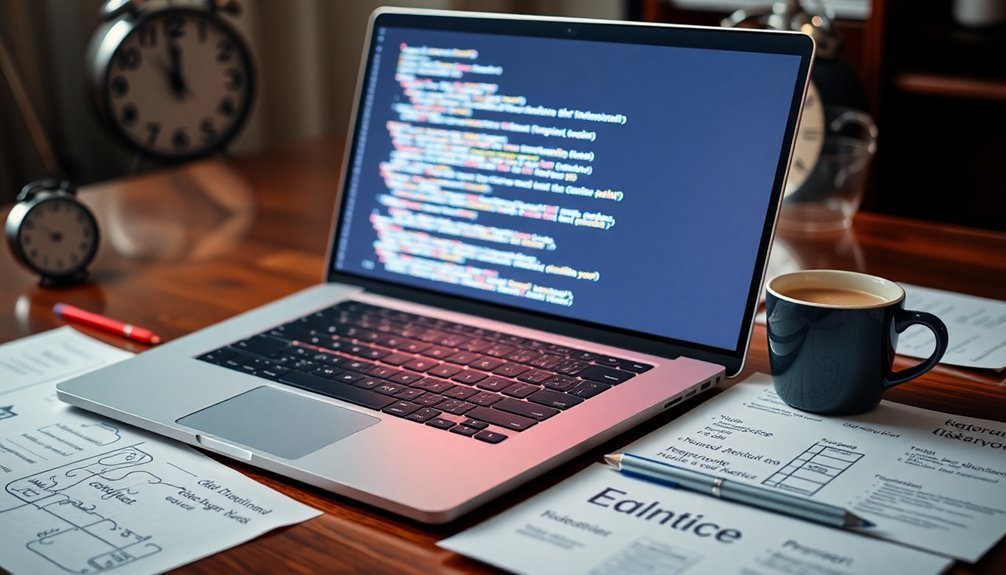To ace your interview, you've got to blend technical skills with strong communication. Start by mastering the common interview questions, like discussing your strengths and past experiences using the STAR method. Be prepared for technical assessments by practicing coding challenges relevant to your field. Research the company to align your answers with its values and culture. Showcase your projects effectively, highlighting your contributions and the impact made. Remember, active listening and clear language matter too. If you keep these strategies in mind, you'll set yourself up for success and uncover even more valuable tips along the way.
Key Takeaways
- Prepare thoroughly by understanding the interview stages and practicing common questions to build confidence and familiarity.
- Showcase relevant technical skills and projects that align with the job role, emphasizing your contributions and impact.
- Use the STAR method to articulate behavioral responses, demonstrating your problem-solving abilities and adaptability through past experiences.
- Communicate effectively with clear language, active listening, and positive body language to engage with interviewers.
- Follow up with a thoughtful thank-you email to reinforce your interest and professionalism after the interview.
Understanding the Interview Process

Steering through the interview process can feel intimidating, but understanding its structure makes it manageable.
You'll typically start with a phone screening, where the recruiter assesses your fit based on your resume and basic skills. Following that, expect technical interviews that delve into your problem-solving abilities and coding skills.
You might also face behavioral questions to gauge your teamwork and adaptability. It's essential to prepare examples of your past work, showcasing your contributions and learnings.
Don't forget to research the company and its culture, as demonstrating alignment can set you apart.
Finally, practice explaining complex concepts simply, so even non-technical interviewers can grasp your expertise. This preparation builds your confidence and enhances your chances of success.
Essential Technical Skills

As you prepare for your interview, it's vital to highlight the technical skills that set you apart from other candidates.
Focus on showcasing your expertise in the following areas:
- Programming Languages: Proficiency in languages like Java, HTML, CSS, and JavaScript (Node.js) can make you a valuable asset.
- Software Development Methodologies: Familiarity with Agile practices demonstrates your ability to work in dynamic environments.
- Debugging Techniques: Your approach to troubleshooting and fixing bugs is important for ensuring software quality.
- Version Control Systems: Knowledge of Git and branching strategies shows your capability in managing code changes collaboratively.
In addition, understanding user experience optimization is crucial as it helps in delivering software that meets user needs effectively.
Common Interview Questions

Preparing for common interview questions is essential for showcasing your qualifications and fit for the role. You'll often encounter inquiries like "Tell me about yourself" or "What are your strengths and weaknesses?" Practice delivering concise and relevant answers that highlight your skills and experiences.
Expect technical questions specific to your field, such as coding challenges or problem-solving scenarios. Don't forget behavioral questions like "Describe a time you faced a challenge." Use the STAR method—Situation, Task, Action, Result—to structure your responses effectively.
Research the company's values and culture to tailor your answers, showing how your background aligns with their mission. Additionally, demonstrating awareness of mental clarity techniques can set you apart by showcasing your commitment to personal development. Finally, prepare questions for the interviewer to demonstrate your interest and engagement.
Showcasing Your Projects

Showcasing your projects effectively can greatly enhance your interview performance. Highlighting your work not only demonstrates your skills but also gives interviewers insight into your problem-solving abilities and creativity.
Here are some tips to present your projects compellingly:
- Select Relevant Projects: Choose those that align with the job you're applying for.
- Explain Your Role: Clearly define your contributions and responsibilities within the project.
- Discuss Challenges: Share obstacles you faced and how you overcame them, showcasing resilience.
- Highlight Impact: Use metrics or feedback to illustrate the project's success and its value to users.
Additionally, consider how your projects can reflect emotional stress that may resonate with the interviewers, as seen in various life experiences like pregnancy cravings.
Researching the Company

Researching the company you're interviewing with is essential for making a strong impression. You should understand their mission, values, and products to tailor your answers effectively. Familiarizing yourself with recent news and industry trends can also boost your confidence during the interview.
Here's a quick table to guide your research focus:
| Research Area | Details to Explore |
|---|---|
| Company Mission | What drives the organization? |
| Products/Services | Key offerings and their market impact. |
| Recent News | Latest developments or achievements. |
| Company Culture | Work environment and team dynamics. |
| Competitors | Key players in the industry landscape. |
Communication Strategies

Effective communication strategies are essential during interviews, as they help you convey your thoughts clearly and build rapport with interviewers.
Here are some key techniques to enhance your communication:
- Listen Actively: Show genuine interest in what the interviewer says by nodding and responding thoughtfully.
- Be Concise: Stick to the point and avoid rambling to keep the conversation engaging.
- Use Clear Language: Avoid jargon unless necessary; explain technical terms simply if they come up.
- Practice Body Language: Maintain eye contact, smile, and use open gestures to convey confidence.
- Recognizing signs of stagnation in your communication style can help you adapt and improve your interview performance.
Demonstrating Problem-Solving Skills

During an interview, demonstrating your problem-solving skills can considerably set you apart from other candidates. You should highlight specific examples where you've tackled challenges effectively.
Use the STAR method—Situation, Task, Action, Result—to structure your responses. When discussing a problem, focus on your thought process: how you identified the issue, what steps you took to analyze it, and the solution you implemented.
Don't shy away from mentioning failures; explaining what you learned from them shows resilience and growth.
Additionally, be prepared to engage in hypothetical problem-solving scenarios posed by the interviewer. This not only showcases your analytical abilities but also your ability to think on your feet, which is essential in fast-paced work environments.
Behavioral Interview Techniques

Behavioral interviews are a key part of the hiring process, as they help employers gauge how you've handled various situations in the past. To excel in these interviews, you should prepare specific examples using the STAR method (Situation, Task, Action, Result).
Here are some techniques to focus on:
- Reflect on past experiences: Identify key challenges you've faced.
- Practice articulating your thoughts: Use clear, concise language.
- Highlight your teamwork skills: Demonstrate collaboration and communication.
- Showcase adaptability: Provide examples of how you handled change.
Preparing for Technical Assessments

Preparing for technical assessments requires a focused approach to guarantee you demonstrate your skills effectively. Start by reviewing key programming concepts and practicing coding problems in your preferred languages. Utilize online platforms to simulate interview scenarios, which can boost your confidence. Additionally, ensure you're well-rested and mentally prepared, as this will help you manage stress and maintain clarity during cold medications which may affect your focus.
| Focus Area | Tips |
|---|---|
| Core Concepts | Revisit algorithms and data structures. |
| Coding Practice | Solve problems daily on platforms like LeetCode. |
| Mock Interviews | Conduct practice interviews with peers. |
Following Up After Interviews

Although you may feel enthusiastic to hear back after an interview, following up effectively can strengthen your candidacy. A well-timed follow-up shows your interest and professionalism.
Consider these key points when crafting your message:
- Send a thank-you email within 24 hours to express gratitude for the opportunity.
- Reiterate your interest in the position and briefly mention a key point from your interview.
- Keep it concise—limit your email to a few paragraphs so it's easy to read.
- Ask about the timeline for their decision to show your keenness without being pushy.
Additionally, remember that your communication style can reflect your audience engagement strategies, which are critical in making a lasting impression.
Frequently Asked Questions
How Can I Improve My Coding Speed for Interviews?
To improve your coding speed for interviews, practice regularly with time constraints. Use coding challenge platforms like LeetCode or HackerRank to simulate interview conditions.
Focus on mastering data structures and algorithms, as they're often the foundation of problems. Break down problems into smaller parts and write pseudocode before coding.
Finally, review past coding sessions to identify areas for improvement, and don't hesitate to seek feedback from peers to enhance your skills.
What Should I Include in My Online Portfolio?
When you think about your online portfolio, consider it your digital handshake.
Showcase your best projects, highlighting your coding skills in languages like Java or JavaScript. Include detailed descriptions, your role, and the technologies you used.
Don't forget to add a section for personal projects and any certifications you've earned.
Make sure your portfolio reflects your personality and professional goals, inviting potential employers to see the real you behind the code.
How Do I Handle Technical Interview Anxiety?
Handling technical interview anxiety starts with preparation. Practice common questions and simulate interview scenarios with friends. Familiarize yourself with the technologies involved, so you feel confident discussing them.
During the interview, take deep breaths and remind yourself that it's okay to pause and think before answering. Focus on the problem at hand rather than the pressure.
Finally, maintain a positive mindset; remember, it's a chance to showcase your skills and learn.
What Types of Questions Should I Ask the Interviewer?
Imagine you're a curious explorer, charting a vast forest of opportunities. As you meet your guide—the interviewer—ask them about the trails they've traveled.
Inquire about the team's dynamics, how success is measured, and the challenges they face. It's your chance to discover whether this journey aligns with your goals.
You'll want to know how they support growth and collaboration, ensuring your path leads to shared success and fulfillment in this adventure.
How Important Is My Social Media Presence During the Hiring Process?
Your social media presence can considerably impact your hiring process. Recruiters often check your profiles to gauge your professional persona and interests.
A well-maintained LinkedIn profile showcasing your skills, projects, and endorsements can enhance your credibility. However, be mindful of your public posts; they should reflect your professionalism.
Engaging with industry-related content also demonstrates your passion and knowledge in your field. So, keep your presence positive and aligned with your career goals.
Conclusion
As you step into your interviews, remember that preparation and authenticity go hand in hand. Coincidentally, the more you align your skills with the company's goals, the more you'll stand out. Embrace the challenges, showcase your projects, and communicate your passion for software engineering. When you combine your technical prowess with genuine enthusiasm, you create a compelling narrative that resonates with interviewers. So, take a deep breath, trust your journey, and get ready to shine!









